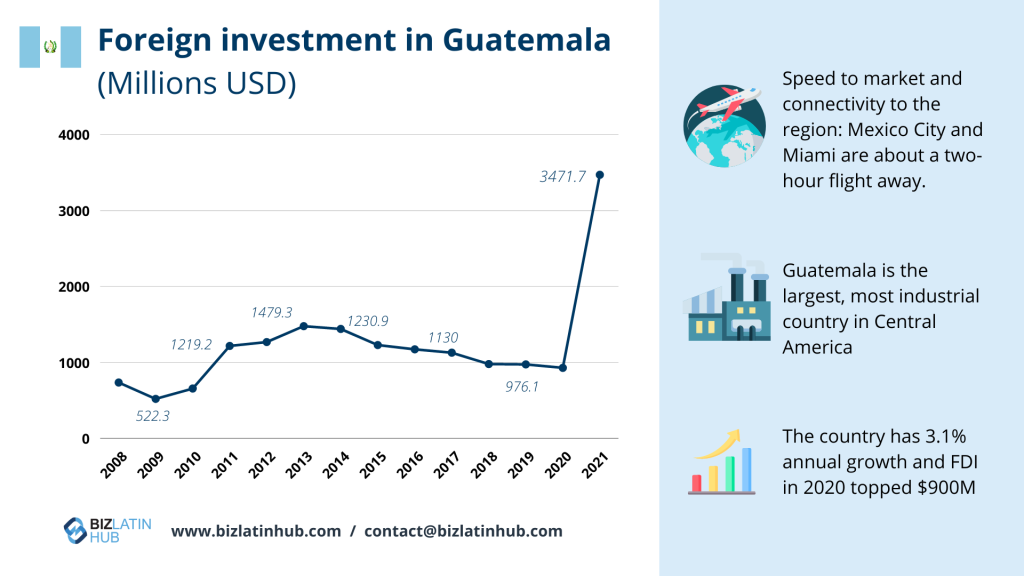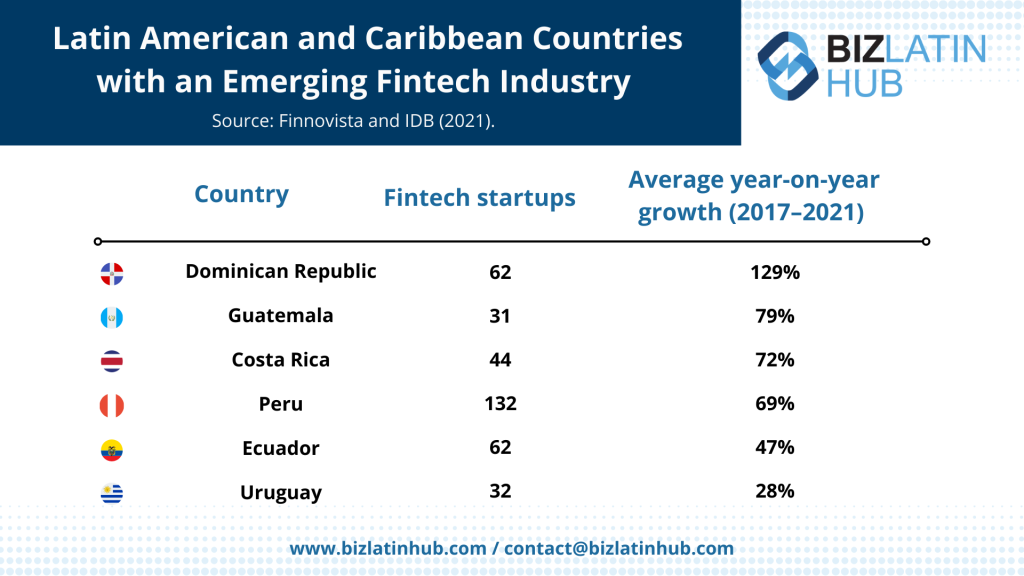Latin America has fast become an attractive destination for nearshoring, due to its proximity to North America, time zone crossover, and growing yet affordable talent pool. Nearshoring in Guatemala could be what your business is looking for. One of the countries in LATAM leading the way in nearshoring is Guatemala. It has the largest economy in Central America that continues to grow despite uncertain global conditions. Guatemala has a reliable infrastructure system, a strong manufacturing industry, and an increasing talent pool of young bilingual workers.
These factors make nearshoring in Guatemala an appealing option for companies in 2024. This article will highlight the many benefits of nearshoring, especially for the IT, customer service, and tech industries. We will also look at what questions you need to consider before nearshoring in Guatemala, for example, what factors are involved in company formation in Guatemala.

What are the benefits of nearshoring in Guatemala?
There are many advantages for your company to explore nearshoring in Guatemala. Below are five leading benefits of nearshoring.
- Low labor costs
- Time-zone alignment
- Educated talent pool
- Ease of doing business
- US Govt policy
1 – Low labor costs
Outsourcing can help businesses reduce costs and save time, ultimately leading to increased profit margins.
Developing and training an internal staff can be both expensive and time-consuming, particularly in countries with high labor and operating costs.
For example, an entry-level software engineer in the US can expect to receive a salary of about US$ 99,000 per year, while a Guatemalan software engineer doing the same role can expect to make around US$ 37,500 per year. That equals an incredible cost saving of well over 50 percent!
Nearshoring in Guatemala also offers a lower cost of living in comparison to major cities in the United States, Canada, or Europe.
2 – Time-zone alignment
Guatemalan workers have similar work hours to their colleagues in the United States, Mexico, and Canada.
Since Guatemala is on Central Standard Time (CST), there is a potential for up to eight hours of synchronous work. This enables seamless team collaboration and eliminates any delays in project completion.
It makes Guatemala the perfect place to set up a regional hub so that you can facilitate business operations across Latin America.
3 – Educated talent pool
Guatemala boasts a growing pool of tech talent, with 16 universities in Guatemala City alone.
Among them, prestigious institutions such as Universidad del Valle and Universidad Francisco Marroquin offer outstanding business education. Furthermore, Universidad Galileo has gained international recognition as one of the top technology schools globally.
Guatemalan developers are both highly skilled and well-educated. For instance, Guatemalan talent helped produce Duolingo and Hotels.com.
4 – Ease of doing business
In the World Bank’s Doing Business 2020 report, a ranking system evaluates countries based on the ease of conducting business, Guatemala ranked ahead of Brazil, Argentina, Ecuador, and Uruguay.
Guatemala welcomes foreign investment and there are very few barriers to foreigners starting a business there. For example, there are also no restrictions concerning the maximum proportion of foreign shareholders in a business.

5 – US Govt policy
The US Congress has introduced two measures aimed at encouraging industry, manufacturing, and intraregional trade. These initiatives demonstrate an increasing recognition of Latin America’s significance, particularly Central America, for US geopolitical and strategic interests. Guatemala, in particular, is well-positioned to profit from both bills.
In short, the bills propose preferential treatment on trade, taxes, credit, and a host of other privileges to incentivize the movement of critical supply chains closer to home.
Guatemala’s proximity to the US makes it primed to benefit from these new laws.
Is Nearshoring in Guatemala right for your business?
Before proceeding with nearshoring, you must consider several factors and ask yourself some important questions:
Is it difficult to find local talent?
If finding employees in your current location is expensive or challenging, nearshoring in Guatemala may be cost-effective. Working with a local partner can also save time and effort in recruitment and local compliance.
Are you comfortable with digital remote project management?
Nearshoring relies heavily on digital connectivity, which may require a cultural shift in your organization if your business typically relies on in-person communication.
What is your overall goal?
Do you plan to hire full-time employees in Guatemala, or do you need tech talent on a per-project basis? This decision will impact the local employment regulations you need to work with. For example, do you need an employer of record?
Is Guatemala the right location for your business?
While Guatemala is becoming a popular nearshoring destination due to its ease of doing business, other Latin American countries also offer attractive options with growing tech talent pools and potential cost savings.
FAQs When Nearshoring in Guatemala
1. What to do when nearshoring in Guatemala?
- Build Relationships.
- Understand the Legal Environment.
- Be Prepared for Bureaucracy.
- Embrace the Culture.
- Focus on Sustainability.
2. What is nearshoring in Guatemala?
Nearshoring in Guatemala refers to the practice of outsourcing business processes or services to companies located in Guatemala, particularly those that are geographically close to the business’s home country. It involves transferring tasks or projects to a nearby country, often in the same time zone or with minimal time difference, rather than outsourcing them to a distant location
3. How does nearshoring in Guatemala compare to offshoring in terms of cost?
Offshoring to Guatemala offers competitive prices and proximity to the United States, making it a cost-effective alternative to offshoring.
4. How to apply nearshoring in Guatemala?
- Assess Needs: Evaluate which processes or services can be nearshored based on requirements and feasibility.
- Research Partners: Identify potential nearshore partners in Guatemala with relevant experience and expertise.
- Establish Communication: Set up clear communication channels for effective collaboration and project management.
- Define Expectations: Clearly outline expectations, goals, and deliverables for the nearshored project.
- Monitor Performance: Continuously monitor partner performance and provide feedback to ensure alignment with standards and objectives.
5. Are there any time zone advantages when nearshoring in Guatemala?
Guatemala is situated on Central Standard Time (CST), therefore, providing an opportunity for up to eight hours of synchronous work. This enables seamless collaboration and alleviates potential project delays stemming from time zones outsides of the Americas.
Biz Latin Hub can assist you with nearshoring in Guatemala
At Biz Latin Hub, we offer a comprehensive range of market entry and back-office solutions in Guatemala, Latin America, and the Caribbean.
Our expertise encompasses nearshoring in Guatemala, hiring and PEO, accounting and taxation, company incorporation, and corporate legal advice.
With offices in major cities across the region and partnerships established in numerous other markets, we possess a vast network of resources, ideally positioned to support cross-border operations and market entry across multiple countries.
Contact us today to find out more about our services and how we can help you achieve your business goals in Latin America and the Caribbean.
If you found this article interesting, be sure to explore the rest of our coverage of the region. Additionally, you can learn more about our team and expert authors here.





